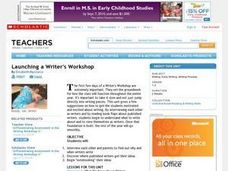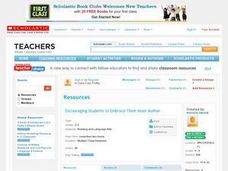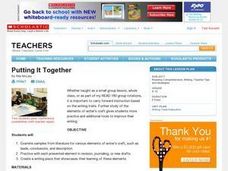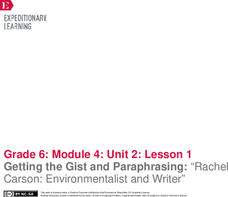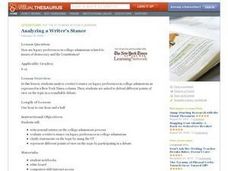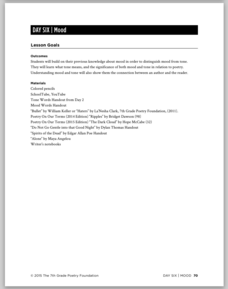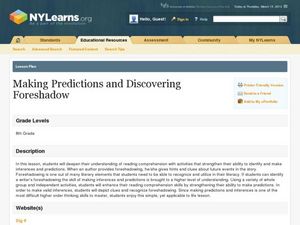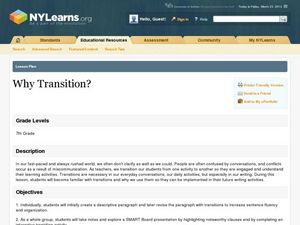Curated OER
Writer's Notebook and Haiku
Students, after viewing various examples from students around the world, as well as writing in their Writer's Notebook, create, compose and revise a Haiku poem that sketches a "snapshot" or image in time. They incorporate the theme or...
Curated OER
Launching a Writer's Workshop
Students interview each other and their parents to examine why and when writers write and where published authors get their ideas. They complete a class T-chart, fill-out an interview worksheet, and read and discuss a variety of book...
Curated OER
Encouraging Students to Embrace Their Inner Author
Everyone is a writer! Youngsters compose an original piece of writing. In this writing lesson, they come up with their own idea for a piece of writing, revise it, and then publish it with illustrations. This lesson includes three...
Curated OER
Putting It Together in Writer's Workshop
This lesson plan about writing can be taught in small groups or large group settings. They examine basic writing techniques and practice using them to improve their writing.
EngageNY
Applying Research Skills: “Rachel Carson: Environmentalist and Writer”
It's important to cite sources! Scholars take a closer look at their research about DDT by examining how to cite sources. Learners take turns sharing information that would be used to cite sources to complement Rachel Carson:...
EngageNY
Getting the Gist and Paraphrasing: “Rachel Carson: Environmentalist and Writer”
Don't copy me. Scholars prepare to dig in with an introduction to their research folder and a discussion about plagiarism. They then review the meanings of harmful and beneficial and how the words apply to the use of DDT. They finish the...
Curated OER
Visualizing While Listening
First graders practice visualization. In this reading and listening comprehension strategy visualization lesson, 1st graders close their eyes and listen to the teacher describe a familiar place, then draw what they visualized in their...
EngageNY
Grade 9 ELA Module 3, Unit 3, Lesson 3
Plagiarism is the theft of intellectual property. To avoid this crime, class members learn how to create a works cited page and how to craft in-text citations. After examining a high-performance model paragraph and an example of a works...
Curated OER
Writing Short Stories: The Fun Way
Do your young authors suffer from writer's block when they try to write short stories? Access their natural creativity with C-Gor, the writing monster! The instructional activity takes aspiring authors through a new writing process...
Curated OER
Analyzing a Writer's Stance
Should college admissions decisions be based on whether whose family members attended? Secondary students read and respond to a New York Times article on the issue of 'legacy preferences' in college admissions. Following class...
K20 LEARN
Arguing With Evidence: Deconstructing Arguments Part 1
In the first lesson plan in a two-part series, high schoolers pick a social issue important to them and examine an article about the topic, the arguments and evidence used to support the writer's stance, and craft two counter-arguments...
Curated OER
Mood
Young scholars learn how to distinguish between the mood of a piece of writing (how the work makes the reader feel) and the tone (the writer's attitude toward the material) in the sixth instructional activity in a poetry unit. After...
ReadWriteThink
Captioning the Civil Rights Movement: Reading the Images, Writing the Words
Scholars boost their knowledge of the Civil Rights Movement with a lesson that challenges writers, readers, and historians to analyze primary sources and caption their observations. By way of reading, writing, discussion, independently,...
Curated OER
the Naturalist's Notebook
Third graders, after brainstorming what they already know about trees and what effect the seasons have on them, create a model of a hollow log. They participate in a young naturalist's notebook writing activity while walking outside...
Curated OER
Using Descriptive Words
Second graders focus on how descriptive words help them see, feel, and hear a story better. They listen to a read aloud of Angela Johnson's, "The Leaving Morning," while giving a thumbs up signal each time they hear a "sense or how"...
Curated OER
Foreshadowing and Making Predictions
"What happens next?" Using real-life scenarios, movies, images, and other prompts, pupils practice making predictions based on inferences from clues. A SMART board activity takes them from making predictions to writing a prediction...
Curated OER
Using Prepositional Phrases
The class reads the book Heckedy Peg. Stopping to point out the prepositional phrases, the teacher models and guides the young scholars to deeper comprehension. Small groups collaborate to read A Sweet Smell of Roses. They thenfind the...
Curated OER
Fact vs. Opinion (Part II)
How can you tell the difference between fact and opinion? Using newspapers, learners determine which articles contain statements of fact, and which articles reflect the writer's opinion. The lesson plan includes a discussion format and a...
Curated OER
Why Transition?
Help your class transition into better writers with this instructional activity, which guides them through the process of adding transitions to increase sentence fluency and organization. The activity is designed for a classroom with a...
Curated OER
Descriptive Writing Using the Book Rumpelstiltskin
Use the fairy tale Rumpelstiltskin to teach your third grade class about descriptive writing. Following a teacher read-aloud of the story, the class brainstorms a list of adjectives describing the main character. Students use this list...
Curated OER
Revision
Young poets learn the value of using a thesaurus when crafting and revising poems. They examine poems rich in figurative language and then a revised version with the figurative language removed. To demonstrate what they have learned,...
Curated OER
Blogging
A fun, modern twist on journaling! Instead of responding to prompts in their composition notebook, writers use the Internet to complete blog entries. A sample blog (with prompts) is shown here, and writers are assessed on conventions and...
EngageNY
Research: Paraphrasing Relevant Information
Young writers practice paraphrasing information from Truth in Advertising? They keep an eye out for examples of false advertising as they read, recording ideas and information in their researcher's notebook along the way.
Curated OER
Informative Essay Writing
High schoolers start by drawing Mr. Essay Man, who is supposed to illustrate the different parts of an essay. After discussing what each component should contain, writers start their essay, guided by the teacher and class discussion....
Other popular searches
- Making a Writers Notebook
- Decorating Writers Notebook
- Creating a Writers Notebook
- Writers Notebook Lesson Plan
- R Fletcher Writer's Notebook



